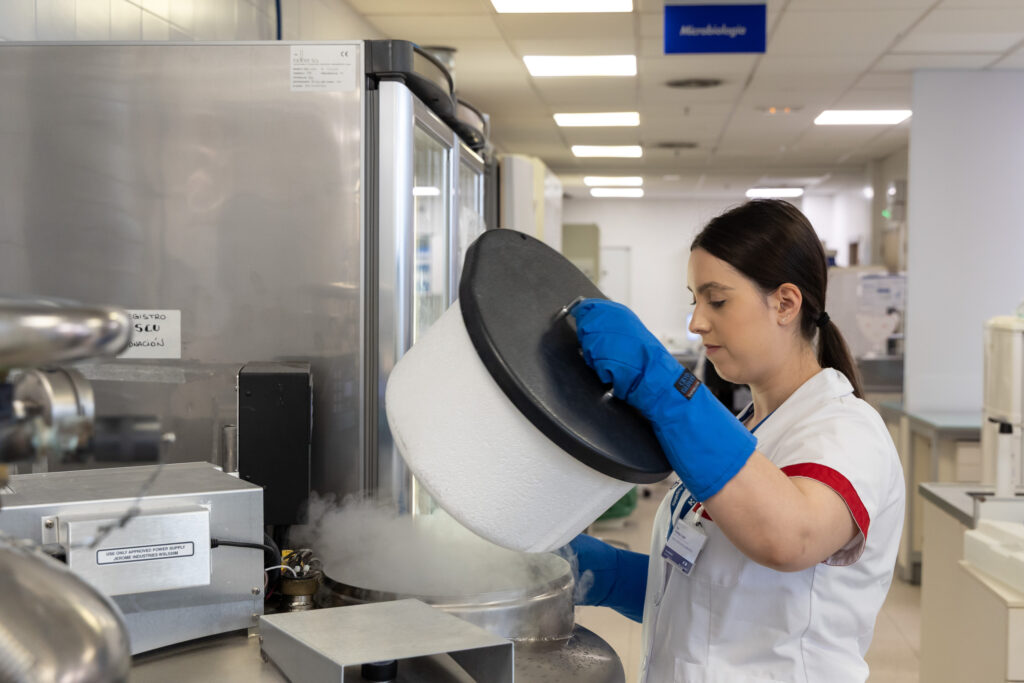Advanced Immunotherapy
What is Advanced Immunotherapy?
Advanced immunotherapy is an innovative treatment that uses the patient’s own immune system to fight cancer. This approach seeks to boost the body’s natural defenses or modify its response to attack tumor cells more effectively. It is a key tool in the treatment of various types of cancer, especially those that do not respond well to other therapies such as chemotherapy or radiotherapy.
What is this test for?
Advanced immunotherapy is primarily used in:
- Cancer treatment: Combats solid and hematological tumors such as melanoma, lung cancer, kidney cancer, lymphomas, and leukemias.
- Immune system stimulation: Enhances the immune system’s ability to identify and destroy cancer cells.
- Relapse prevention: Helps reduce the risk of cancer recurrence after other treatments.
- Therapeutic personalization: Offers options adapted to the patient’s tumor’s genetic and molecular profile.
Benefits of high technology in advanced immunotherapy
Advanced immunotherapy uses different strategies to activate or modify the patient’s immune system. Among the main modalities are:
- Immune checkpoint inhibitors: Block proteins like PD-1, PD-L1, or CTLA-4 that cancer cells use to evade immune system attack.
- Cancer vaccines: Stimulate the immune system to recognize and attack specific tumor cells.
- Modified T-cell therapy (CAR-T): Involves extracting T cells from the patient, genetically modifying them to attack cancer, and reintroducing them into the body.
- Cytokines: Proteins like interferons and interleukins that regulate and stimulate the immune response.
- Monoclonal antibodies: Designed to attack specific proteins on cancer cells or help the immune system identify them.


What is the procedure like?
The advanced immunotherapy procedure:
-
Preparation:
In the initial consultation, your oncologist will review your medical history and analyze the results of previous tests, such as biopsies, genetic studies, and molecular analyses. Then, complementary studies will be performed to evaluate if you are a candidate for advanced immunotherapy.
-
During the test:
Immunotherapy can be administered in different ways, such as intravenously, subcutaneously, or through cell infusion, in the case of treatments like CAR-T. During each session, your medical team will monitor you for possible side effects and to assess how you are responding to the treatment. The duration varies depending on the type of immunotherapy and your evolution, but it is usually carried out in cycles that can last weeks or months.
-
After the test:
You will be regularly monitored to assess your response to treatment and detect possible side effects. For this, you will undergo periodic tests, such as blood tests, imaging studies, and biopsies, which will help measure the effectiveness of immunotherapy. Then, you will review the results with your oncologist, who will adjust your treatment plan if necessary.
Recommendations for the test
It is essential to inform your medical team if you have allergies to medications or any material used during the treatment. It is also important to follow all instructions before, during, and after the procedure to ensure your safety and achieve the best results. If you experience symptoms such as fever, extreme fatigue, inflammation, or difficulty breathing, report them immediately to your doctor.
Does it have any risks?
Advanced immunotherapy is a safe treatment, but it can have side effects related to immune system activation:
- Cytokine release syndrome: An exaggerated immune system reaction that can cause fever, low blood pressure, and difficulty breathing.
- Organ inflammation: In some cases, the immune system can attack healthy tissues, causing inflammation in organs such as the lungs, liver, or intestines.
- Fatigue: Feeling of extreme tiredness during treatment.
- Allergic reactions: Although rare, they can occur due to the administered medications.
For your test to proceed smoothly, we ask that you arrive in advance of the indicated time. This will allow us to carry out the necessary administrative and clinical preparation.
Before the test, we will provide you with the Informed Consent, a document with important information that you must read and sign.
If your appointment is for a Magnetic Resonance Imaging (MRI), it is crucial that you inform us about the presence of pacemakers, metallic objects, prostheses (including dental ones), tattoos, or medication infusion devices, such as insulin pumps.
These diagnostic tests are very safe, but as with any medical procedure, there is a minimal possibility of incidence.